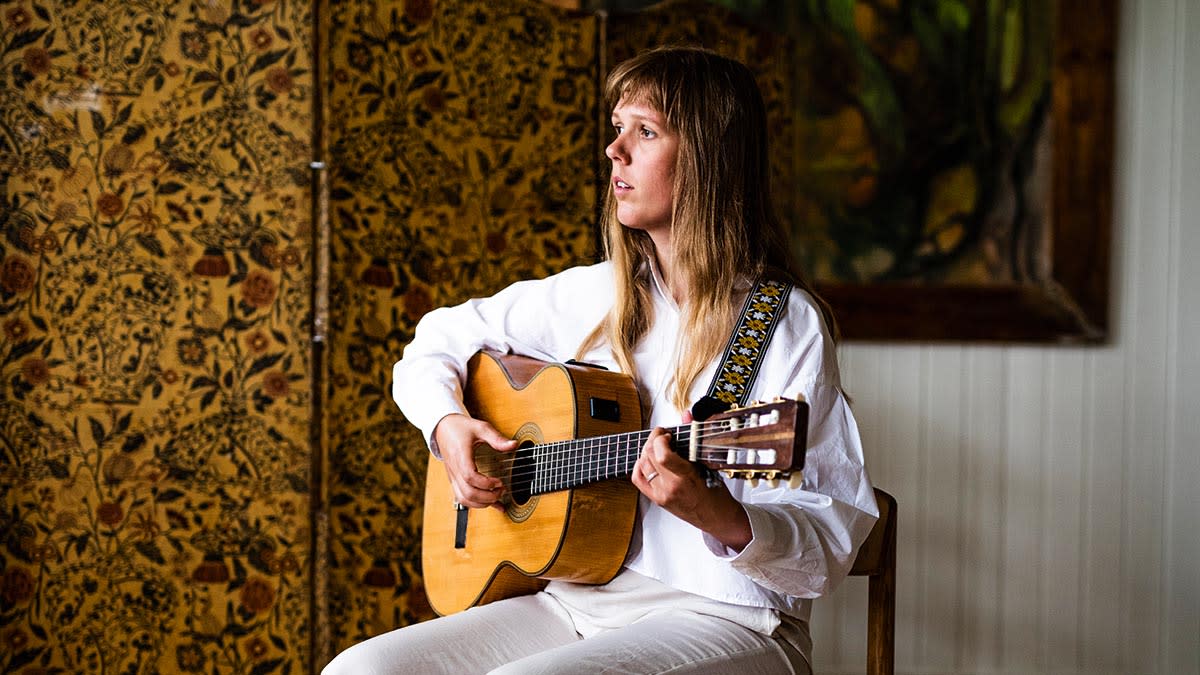“The nylon-string guitar is obviously the most beautiful instrument in the world”: Norwegian singer-songwriter Juni Habel on making hazy acoustic folk without a steel-string in sight

Juni Habel is a Norwegian singer-songwriter based in Rakkestad, in the south of the country. She crafts beautiful hazy folk songs, centred around her acoustic guitar picking and with minimal backing.
The acclaimed Carvings is her second album, following 2020’s All Ears. “Both of my albums have been based around the guitar playing and vocals,” Juni tells us. “My vision for them was very minimalistic; I just wanted to play my songs. If anything else fitted then we could add it, but it was mainly about the song.”
Just enough
This minimalist approach gives Juni’s work a sound that feels timeless and suits the rural nature of her surroundings. “I’m very conscious of keeping things away,” she says.
“It can be very tempting and safer to dress the songs with cool things. You can think that the more you add will make the song better and richer and more exciting. Or you could be scared that the listener might get bored. But my co-producer Stian [Skaaden] and I talk a lot about this and we take things away the whole time.
“We tried so much stuff [when recording], but kept about 10 per cent. I’m grateful to him because he would say to me, ‘This is enough, it doesn’t need to be more.’”
Gut feeling
Carvings is a beautiful collection of deep writing; life and death are considered on songs that are happy to last past the five- or six-minute mark. The whole thing feels self-assured.
“I’m getting more and more confident,” Juni says. “In the beginning, I wasn’t confident at all and I would call my friends and family to hear their opinions of things. But now I’m trusting my gut and trusting my own sense. I now know what is right for the song, which is a skill I’m developing more.”
She pauses. “That can take a lot of time and it can be messy; you are not guaranteed to end somewhere good, either – and I have done that. Sometimes the song just doesn’t land and it never gets finished.”
Why so serious?
Juni comes across as a meticulous writer and musician, an artist set on the crafting of her songs and protective over the delicacy of her arrangements, something she is aware of.
“An important part of this project has been about realising how to not take music so seriously,” she says. “This was very serious in the beginning and the topics were deep, but songs like When We Awake and Drifting Pounds Of The Train were very cathartic to write because they were saying that I don’t have to fight so hard to make great music – because it doesn’t matter that much. Life is much bigger than music, so there is not much at stake. Nobody will get hurt.”
Emotion rules
When starting out on guitar, players such as Neil Young and fellow Norwegian Ane Brun informed Juni, but she has reached a level where her own objectives have become clearer.
“My goal is to do as little as possible and to add a lot of emotion,” she says. “But I also like to play with varying tempos – it is a more experimental and performance-based way of looking at the guitar. [New Zealand singer-songwriter] Aldous Harding is a big hero of mine and I was thinking, ‘Wow, can you really play it like that? Is that allowed?’ It was so simple, the most basic chords, but played with so much emotion. She was a revelation to me.”
Practical magic
Juni chooses a nylon-string guitar to deliver her songs, though she admits to not being the best at maintenance. “The nylon-string guitar is obviously the most beautiful instrument in the world,” she says, “but I don’t care much about equipment. I have the cheapest gear to record, except a good microphone. I don’t care about the brand, but I like old guitars.
“I have two, both are from the ’70s: the one I use the most is an Oskar Teller guitar that I got from a builder in Copenhagen. It’s great, but I’m bad at taking care of it. My husband is a guitarist, too, and I can be clumsy. He’s often like this [makes face of despair]!”
Carvings is out now via Basin Rock.

